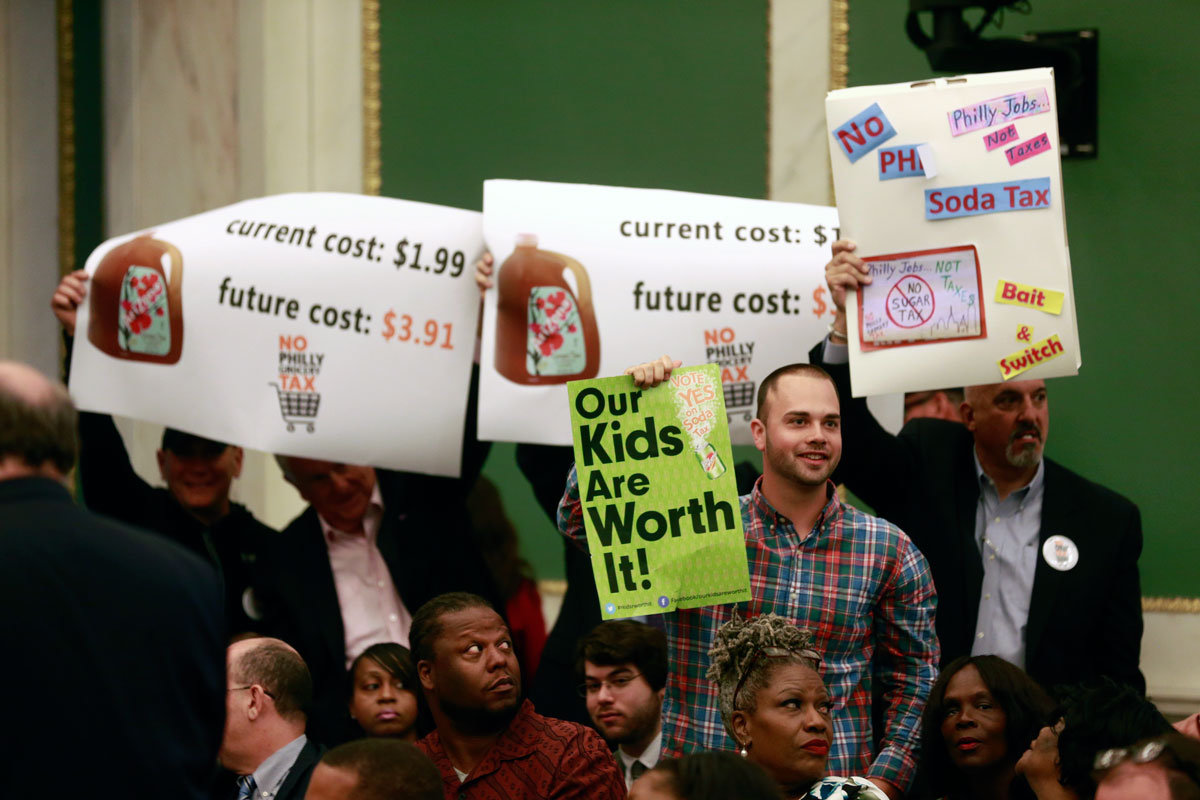
In the News
Health Experts: Philly Soda Tax Could Start National Movement
-
Focus Areas
Chronic Disease Prevention, Healthy Communities -
Issues
Nutrition & Food Security -
Expertise
Public Policy Advocacy

The public health community far and wide reacted instantly and enthusiastically to Philadelphia City Council’s final vote Thursday to tax sweetened beverages. It also largely avoided commenting on one big part of the new tax: the inclusion of artificially sweetened drinks.
Some also noted an irony: The mayor who intentionally did not emphasize public health in campaigning for the tax could end up causing a major impact on his city’s well-being. And his example will likely resonate in other American cities, experts predicted.
Lynn Silver, a physician, researcher, and advocate for the California-based Public Health Institute, said she thought singling out beverages – at least those sweetened with sugar – for a tax would quickly win public acceptance around the country. She compared it with smoke-free air regulations, which seemed like an oddity when first proposed.
“This is an idea whose time has come,” said Silver, who is studying the impact of a penny-per-ounce sugar-sweetened beverage tax in Berkeley, Calif., the only other jurisdiction to impose a levy so far. Sales of “unhealthy” beverages are down there, while more “healthy” drinks are being sold, she said.
Philadelphia’s tax would be 1.5 cents an ounce.
The Washington-based Center for Science in the Public Interest said in a statement that Thursday’s vote “is a huge win for the city’s children and parents, who will now benefit from expanded pre-K and parks.”
Barry M. Popkin, a researcher at the University of North Carolina, Chapel Hill, who has been studying the impact of a sugar-sweetened beverage tax in Mexico (where consumption is down 12 percent), said the latest measure “will improve significantly the health of Philadelphia’s low-income population over a five-year period.”
Although public health was not emphasized during the debate, Popkin, like others, said Kenney’s plan for using much of the revenue for education, recreation, and libraries would be a crucial part of the benefit.
Public health researchers said evidence for the harm caused by liquid sugar is overwhelming.
Lauren Kane, a spokeswoman for the American Beverage Association, argued otherwise in an email: “The obesity rate in America went up steadily (24 percent) from 2000-2014 at the same time calories in the American diet from soda went down 39 percent and soda consumption is at a 30-year low.”
The No Philly Grocery Tax Coalition, which fought the tax until the last minute, said that a “perfect storm” – a new mayor still on his honeymoon, a Council eager to work with him, popular programs that would benefit from the revenue – led to final passage. Public opinion had turned against the tax, spokesman Larry Ceisler said, and would be a decisive factor in jurisdictions that require a public referendum.
“In reality, it will be difficult for this to be passed beyond a handful of outlier cities,” he said.
How to view the inclusion of diet drinks, a surprise compromise move by City Council last week, stumped some public health advocates.
“That’s a good question. We promote consumption of water as the best thing for you,” said Dwayne Wharton, director of external affairs for the Food Trust in Philadelphia, who said he had been receiving “lots of congratulations and inquiries from other communities from around the nation.”
Stacey C. Cahn, a psychologist at the Philadelphia College of Osteopathic Medicine, studies behaviors that affect weight and health. She cited emerging evidence, much of it from animal studies, that even artificially sweetened beverages might promote weight gain. She likes the expanded tax.
“Let’s keep in mind that diet soda has no nutritional value whatsoever,” she said. “You are basically discounting diet soda if you don’t tax it.”
Continue reading the full article in the Philadelphia Inquirer.
Read a similar article on Creators Syndicate.
Originally published by Philadelphia Inquirer
More Updates
Work With Us
You change the world. We do the rest. Explore fiscal sponsorship at PHI.
Support Us
Together, we can accelerate our response to public health’s most critical issues.
Find Employment
Begin your career at the Public Health Institute.



